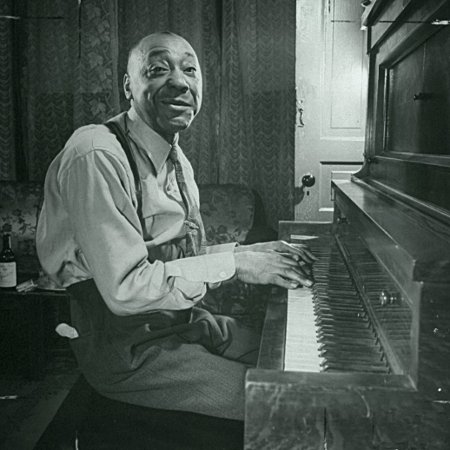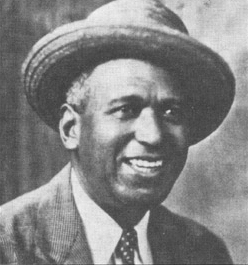Early masters of the boogie woogie piano style were said to play with "a left hand like God."
They had names like "Stavin' Chain," "Kid Stormy Weather," "Porkchops," "Skinny-Head Pete," "Papa Lord God," "Slamfoot Brown," and "The Toothpick." There were several "Pine Tops." They were one-man bands, and they all played a similar style of blues piano with a heavy left hand and a walking bass. This edition of Riverwalk Jazz celebrates the rompin', stompin' rhythms of the boogie woogie beat and its early disciples.
'Cow Cow' Davenport is often credited with coining the term boogie woogie. By the time Davenport came onto the scene, the style had been around for more than 30 years, but no one had ever called it boogie woogie. This unmistakable 'rolling bass' style of piano playing had a different name in every part of the country, names like— 'overhand,' 'the fives,' 'fast Texas piano,' 'hop scop,' 'the dirty dozens,' 'the sixteens,' or 'the rocks.'
.jpg)
Typical barrelhouse scene. Photo courtesy John Tennison, Boogie Woogie Foundation.
The inventors of the boogie woogie beat hammered on ancient upright pianos, mildewed by humid night air in the piney woods and by frequent baptisms of beer. They were the stars of barrelhouse joints in the backwoods of east Texas and western Louisiana. They played in shacks with dirt floors that sold Royal Crown cola, homemade booze and good times every night of the week. Barrels of 'chock' beer and 'moonshine' whiskey lined the walls and gave these dives (and the piano style they nurtured) their name—'barrelhouse.'
Boogie woogie blues had a captive audience. Loggers from the lumber camps deep in the woods, and workers laying track for the Texas and Pacific railroad, carving a line of steel through the wilderness. The sounds of barrelhouse boogie woogie spread out in all directions following the path of new railroad lines.
Eubie Blake remembered hearing Will Turk, one of the early masters, playing with an unmistakable boogie bass line in Baltimore in the 1890s. Blake said, "Turk didn't know what key he was playing in but he played them all. He weighed more than 300 pounds and had a left hand like God."

Jimmy Yancey was active in and around Chicago playing house parties and clubs from 1915. Photo courtesy chicagosouthsidepiano.
Around 1900 in New Orleans, when he was just a teenager, Jelly Roll Morton recalled hearing a piano player by the name of 'Lost John' from Birmingham, Alabama playing 'that rolling bass.' Roy Carew, a contemporary of Jelly Roll, declared that Boogie woogie was "the bad boy of the rag family who wouldn't study."
About the same time in Shreveport, the bluesman Leadbelly heard an old-time Louisiana piano player who called himself "Pine Top" playing boogie woogie. Leadbelly picked up Pine Top's rhythmic style and imitated it on his guitar. Leadbelly said, "That's what I wanted to play, that boogie woogie piano bass. I always wanted to play those piano tunes on my guitar. I got it out of the barrelhouses."
Boogie woogie stomped and wiggled its way across the country. In 1904, Stavin' Chain was playing boogie in dance halls in Donaldsville, Louisiana, and Charlie Mills was playing it on the riverboats around New Orleans. In 1909, W.C. Handy heard boogie woogie in the Monarch saloon on Beale St. in Memphis. In 1911, George Thomas wrote his "Hop Scop Blues" and took it to New Orleans, where it became the first boogie woogie-style tune to be published on sheet music in 1916.
.jpg)
"Pine Top's Boogie Woogie" was first recorded in 1928. Photo courtesy Red Hot Jazz.
Special guest, pianist Dick Hyman joins The Jim Cullum Jazz Band on boogie woogie classics by Jelly Roll Morton, Cow Cow Davenport, Jimmy Yancey, Meade Lux Lewis, Albert Ammons, James P. Johnson, and Clarence 'Pine Top' Smith.
"Pine Top's Boogie Woogie" launched a fad that swept the world in the 1930s and 40s. The boogie woogie craze was the most spectacular revolution in popular music to come along until Elvis Presley's "Blue Suede Shoes." In many ways, boogie woogie is the father of rock and roll. To quote Little Richard, "Everything I play is boogie woogie...rock and roll is just up-tempo boogie woogie!"
Photo credit for Home Page: Dick Hyman. Photo courtesy of the artist.
Text based on Riverwalk Jazz script by Margaret Moos Pick ©1995


